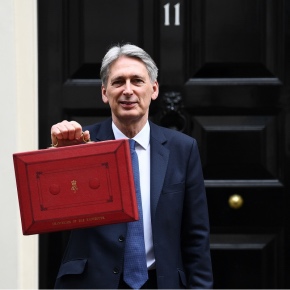
Construction industry reacts to Spring Budget 2017
Chancellor Philip Hammond has delivered his first – and final – spring budget which, in his words, reflects ‘an economy that has continued to confound the commentators with robust growth’.
The spring budget did not contain any major announcements for infrastructure or the construction industry, but did emphasise a greater focus on developing technical skills with the introduction of T-Levels.
The T-Level system will overhaul how technical education is is taught by increasing the number of hours students train by 50 per cent to an average 900 hours per year. The system will replace the current 13,000 qualifications with 15, and will be paid for through an extra £500m a year of extra funding.
The 15 courses will include catering and hospitality, engineering, manufacturing and construction amongst others.
During his budget announcement, Philip Hammond commented: “We commit to this programme because we understand choice is the key to excellence in education.”
Industry reaction
Industry reaction was largely positive and is seen as an important step in boosting productivity in the future.
Brian Berry, chief executive of the Federation of Master Builders (FMB): “The Chancellor clearly understands that the UK won’t address the productivity challenge unless we rethink our approach to technical and vocational education.
T-Levels could be the answer if they genuinely rival A-Levels in the eyes of parents, teachers and young people. UK society as a whole has been guilty of putting too much emphasis on the academic route – this has made it more difficult for vital sectors like construction and house building to attract the talented people we need.
In construction, we are suffering from a severe skills shortage and this is likely to worsen once we leave the EU and no longer have easy access to European labour. This £500 million funding announced today for T-Levels is therefore a welcome and much-needed boost.
Today’s Budget was an all-round strong performance from the Chancellor and he had good news to report right across the piece. However, increasing tax on the self-employed is not helpful. If we want to establish a resilient, Brexit-proof economy, we must encourage and support our current and future entrepreneurs in the construction industry and beyond.
A jump in National Insurance Contributions from 1% to 10% next year could send the wrong message to those individuals who are considering going it alone. The self-employed are the backbone of our economy and the Government should tread carefully here.”
Latest news

21st February 2025
ASSA ABLOY EMEIA: Save valuable time and money with a seamless switch to programmable digital keys
In 2025, access management can be a whole lot easier. By making access part of their digital processes, businesses can put time-consuming key management and the cost of changing the locks firmly behind them. Making this switch is a lot easier than many people think, as ASSA ABLOY explains here…
Posted in Access Control & Door Entry Systems, Architectural Ironmongery, Articles, Building Industry News, Building Products & Structures, Building Services, Doors, Facility Management & Building Services, Health & Safety, Information Technology, Innovations & New Products, Retrofit & Renovation, Security and Fire Protection
21st February 2025
Showersave supports industry leaders in addressing Part L and Part G regulations
Showersave has sponsored and participated in a recent Building Insights LIVE roundtable on ‘Water & Energy Saving Innovations in New Build Housing’.
Posted in Articles, Bathrooms & Toilets, Bathrooms, Bedrooms & Washrooms, Building Associations & Institutes, Building Industry Events, Building Industry News, Building Products & Structures, Building Regulations & Accreditations, Building Services, Exhibitions and Conferences, Interiors, Pipes & Fittings, Plumbing, Retrofit & Renovation, Sustainability & Energy Efficiency
21st February 2025
GEZE: The importance of Specifying High Quality Door Closers on Fire Doors
Andy Howland, Sales & Marketing Director at GEZE UK, discusses why specifying high quality door closers on fire doors is important…
Posted in Access Control & Door Entry Systems, Accessibility, Architectural Ironmongery, Articles, Building Industry News, Building Products & Structures, Building Regulations & Accreditations, Building Services, Doors, Facility Management & Building Services, Health & Safety, Posts, Restoration & Refurbishment, Retrofit & Renovation, Security and Fire Protection
21st February 2025
Insight Data achieves ISO9001 recertification with zero non-conformities
Leading industry data specialist, Insight Data, has successfully achieved the prestigious recertification for ISO9001 with zero non-conformities for the fourth consecutive year.
Posted in Articles, Building Industry News, Building Regulations & Accreditations, Building Services, Information Technology, Research & Materials Testing
 Sign up:
Sign up: